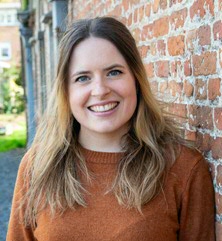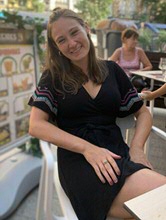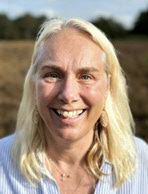Speakers

Sergio Miguel Pereira Soares (Max Planck Institute for Psycholinguistics, Nijmegen)
Sergio Soares completed his PhD at the University of Konstanz (Germany) in 2022, focusing on multilingual language acquisition and the impact of bilingualism on cognitive processes. Using EEG techniques and various tasks, he studied early and late bilingual adults. Since May 2022, he has been a post-doctoral researcher in the Early Precursors Project, which investigates individual differences in language and cognitive development. The project's goal is to determine how early neural indicators—measured through EEG—and early life environments influence later language and cognitive outcomes.
“Uncovering Early Neural and Linguistic Developmental Trajectories: A Longitudinal Study”
It is clear that changes that take place in the brain in the first year of life lay the foundations for later cognitive development, including language acquisition. There is, in particular, some evidence suggesting that individual differences in brain structure/function in the first year of life might predict individual differences in later language acquisition. However, this literature is not large, participant numbers are frequently low and more often than not results are inconsistent and piecemeal. Importantly, brain (EEG) results are usually cross-sectional and not longitudinal, which means that we lack the knowledge of how (individual) changes across the first year of life affect later language. In the present talk, I’m going to present (preliminary) findings from two studies tapping into distinct longitudinal aspects from language acquisition. The first investigates the connection between perception and production trajectories in early language acquisition by examining the neural underpinnings of perceptual tuning in infants and their potential relation to vocal development. We examined the emergence and maturation of mismatch responses (MMRs) to native (/ba/-/pa/) and non-native (/pa/-/pha/) phonemic contrasts in Dutch monolingual infants at 6, 9, and 12 months of age. EEG was recorded during an auditory passive double-oddball paradigm and additional data was collected on vocal development, family-background, and early comprehensive and productive language skills at 12 months of age. The second study looks at resting-state EEG (rs-EEG) oscillatory power within the first year of life and its possible link(s) with early language development. Three minutes each session of rs-EEG data was recorded from the same Dutch monolingual infants. Overall, across the two datasets, we observe (some initial) signs of brain maturation and relationships with language development.

Julie Daelman (Ghent University)
Julie Daelman (she/her) obtained her PhD at Ghent University in 2024. Her research primarily focuses on the added value of narrative skills within language diagnostics and intervention, with the aim of improving language support for multilingual children in speech therapy. She currently works as a speech therapist at the Multilingualism Expertise Center at Foyer vzw, where she actively contributes to innovative support programs for multilingual families. Prior to this, she was a mandate assistant at the Center for Speech and Language Sciences (CESLAS) at Ghent University for seven years, where she combined research with teaching. Her passion for multilingual language development and inclusive language diagnostics remains the common thread in her work.
“De meerwaarde van narratieve vaardigheden en dynamisch onderzoek bij de diagnostiek van taalontwikkelingsstoornissen bij (meertalige) kinderen”
Taalonderzoek bij meertalige kinderen vereist een specifieke aanpak, aangezien taalproblemen bij meertalige kinderen kunnen worden veroorzaakt door een taalontwikkelingsstoornis of door een beperkte blootstelling aan een van de gesproken talen (Kohnert, 2010). Een taalontwikkelingsstoornis zal zich echter in alle talen die het kind spreekt manifesteren, waardoor een meertalig kind idealiter in alle gesproken talen wordt getest. Door de diversiteit aan talen en de variatie in taalleertrajecten is dit in de praktijk vaak een uitdaging voor logopedisten. Het onderzoeken van vaardigheden die minder afhankelijk zijn van taalspecifieke kennis, zoals vertelvaardigheden, of het gebruik van dynamische diagnostiek om leerpotentieel in kaart te brengen, kan een waardevolle aanvulling zijn op de huidige diagnostische aanpak. In deze lezing zal op basis van recent wetenschappelijk onderzoek worden toegelicht hoe narratieve taken en dynamisch onderzoek kunnen worden aangewend om taalstoornissen bij meertalige kinderen te identificeren en remediëren.

Cheyenne Svaldi (University of Groningen)
Cheyenne Svaldi is a postdoctoral researcher in the Childhood Language Disorders (CLaDis) lab of the University of Groningen. Her research focuses on childhood language disorders, such as language impairments in children with a brain tumour and developmental language disorders. She also investigates the relationship between brain structure and language performance (e.g., word learning) in children with language impairment.
“We must not forget about the brain: Neuroanatomical differences in DLD”
Developmental language disorder (DLD) is a neurodevelopmental disorder and is linked to a reduced neural capacity to learn and process language. While several brain regions (e.g., the basal ganglia) may differ between children with DLD and typically developing children, studies investigating the relation between these neuroanatomical differences and language performance are scarce. In this presentation, recent research of the Child Language Disorders (CLADIS) lab will be discussed, focusing on the neuroanatomical correlates of word learning in children with DLD. Both gray (e.g., cortical thickness) and white (e.g., thickness white matter pathways) matter structures were investigated using multiple neuroimaging methods. The first results confirm differences in brain structure between children DLD and typically developing children (e.g., in the arcuate fasciculus), which may be related to word learning performance. Clinical and theoretical implications of these findings will be discussed.

Jeannette Schaeffer (University of Amsterdam)
Jeannette Schaeffer is a linguist specialising in language acquisition in neurotypical and neurodivergent children, teenagers and adults. She started her journey in linguistics by studying Dutch and Italian child language during her MA degree at Utrecht University. Then she went on to earn her PhD degree from UCLA in 1997 and afterwards became a Postdoc at MIT until 1998. From 1998 to 2011 she worked at Ben Gurion University in Israel focusing on bilingualism and Hebrew and Russian child language. Later on she became interested in how children with some sort of impairment, like SLI or autism, acquire their mother tongue. Since 2011, Jeannette has been at the University of Amsterdam, first as assistant professor and later as full professor.
“Autisme, Taalwetenschap en Taalontwikkeling”
Autisme is een levenslange, erfelijke conditie die van invloed is op de manier waarop mensen met anderen omgaan. Taal speelt hierbij een belangrijke rol, alhoewel taal niet deel uitmaakt van de kerndimensies van autisme volgens de DSM-5-TR (APA 2022). Ik zal ingaan op mogelijke taalprofielen van autistische kinderen en hoe die verschillen van die van niet-autistische kinderen. Ook verschillen in taalontwikkeling komen aan bod en hoe deze op hun beurt theorieën over taal(ontwikkeling) kunnen informeren. Deze verschillen zorgen voor taalbarrières, waardoor autistische mensen zich vaak geïsoleerd voelen. Dit leidt tot verhoogde percentages van schooluitval, werkloosheid, depressie, criminaliteit, en zelfs zelfmoord in de autistische gemeenschap. Ik zal beargumenteren dat a) taalwetenschappelijk onderzoek cruciaal is om de heterogene taalprofielen van autistische kinderen te identificeren en verklaren, en hen op basis daarvan adequaat te ondersteunen, en b) interdisciplinaire samenwerking met bijvoorbeeld geneeskunde en rechten noodzakelijk is om genoemde taalbarrières te herkennen, begrijpen, en doorbreken.
